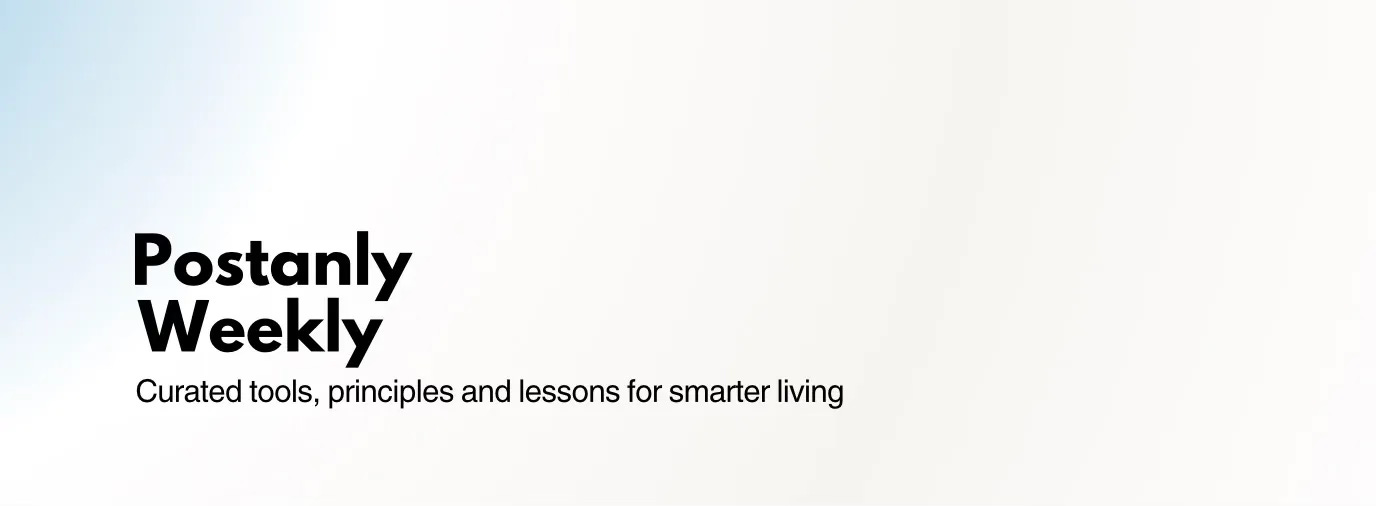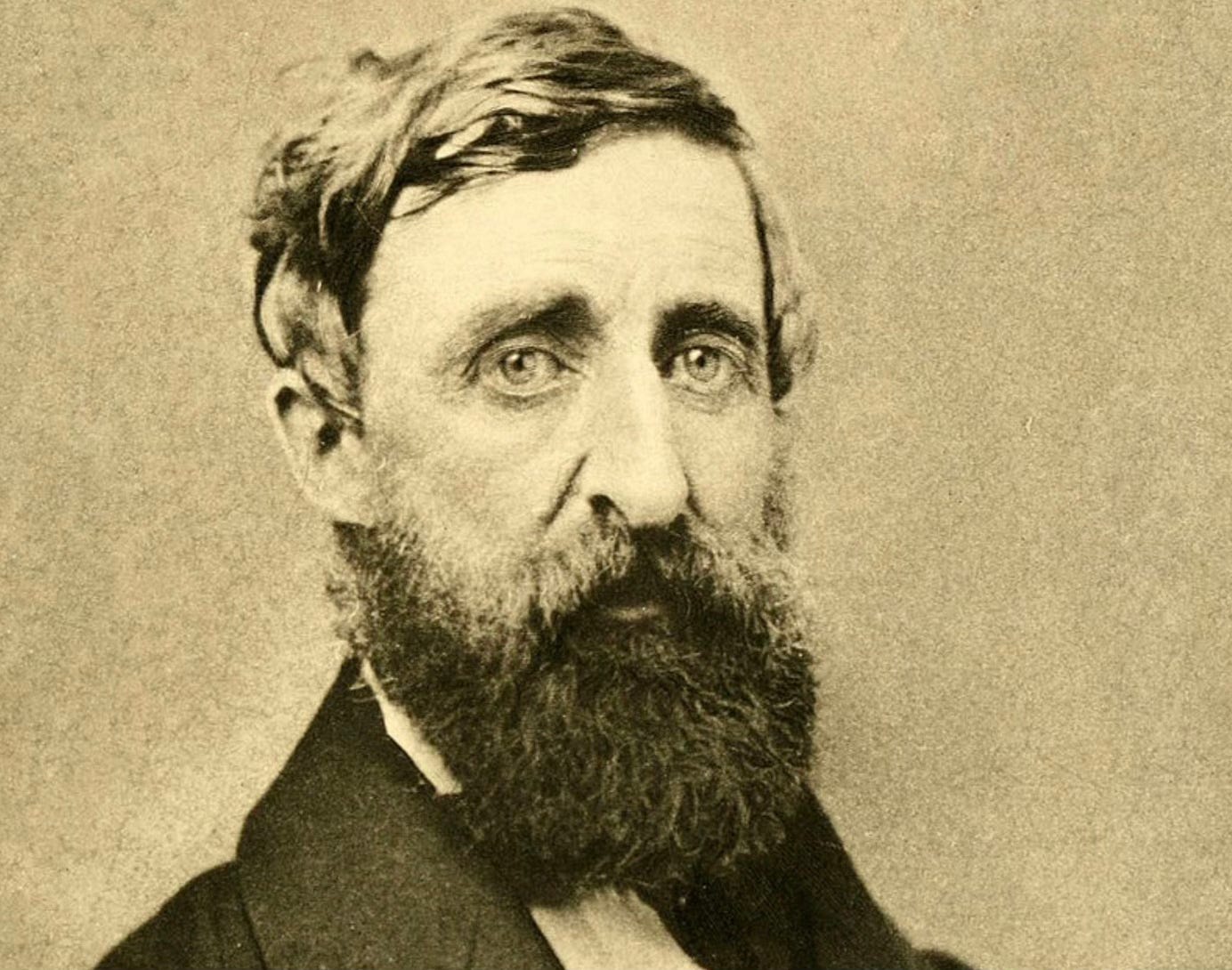5 Life Lessons From Henry David Thoreau’s Simple Life Experiment
A Slow, Simple Life Might be a Virtue
Postanly Weekly is a reader-supported smarter living newsletter. To support my work, you can upgrade to a paid subscription for $9 per month or $60 for an entire year. Or use this special link for 50% off forever.
Plus free access to The Thinking Edge.
In partnership with Shortform
Self-improvement books are indispensable for personal growth. But their actionable ideas and lessons are not always easy to find. Shortform is an easily digestible solution to this obstacle. The summaries and the vast library of the most impactful self-help books can help you learn and apply wisdom faster.
Shortform distills each book's core ideas with chapter breakdowns, analysis, commentary, and even counterpoints from other sources, allowing you to get the most of books fast. They have all of my favourite books on self-improvement. Shortform doesn’t stop at books. They’ve got guides for articles and podcasts. Experience a new level of personal growth with Shortform.
Postanly readers get a free trial and 20% discount on the annual subscription.
The Thinking Edge is Live
It’s a 27 day email course called The Thinking Edge
You get 27 (plus future updates) powerful thinking tools, models, principles for life and career. Inspired by the wisdom of brilliant minds.
…All for just $27.
The Thinking Edge is a comprehensive toolkit to expand your mental models. Master your tools. Learn the logic of the systems that determine your output.
“I basically load my head full of mental models.” — Naval Ravikant
In my effort to live a simple but conscious life, I’ve been learning a lot from Henry David Thoreau, a naturalist, essayist, and philosopher.In the 19th century, Thoreau made an unusual choice. He left behind the demands of society and moved into the woods. He wanted to strip life down to its essentials and understand what truly matters. His book Walden tells the story of that experience.
It's both a personal memoir and a guide to simple living.
More than 150 years later, it still speaks to people. Thoreau's core message: live simply and stay true to yourself. It’s still relevant now. He saw nature as more than scenery. For him, it was a source of wisdom and a mirror to the human spirit. He believed by slowing down and reconnecting with the natural world, we could rediscover ourselves.
Thoreau didn’t reject modern life out of bitterness. He made a conscious choice to simplify his life. His message feels more urgent than ever. Thoreau’s life reminds us that we can slow down. We can question what we truly want. We can find joy in the small and the simple. He challenges us to let go of clutter, pressure, and false ideas of success and get back to the basics.
“To what end do I lead a simple life at all, pray? That I may teach others to simplify their lives? — and so all our lives be simplified merely, like an algebraic formula? Or not, rather, that I may make use of the ground I have cleared to live more worthily and profitably?” writes Thoreau.
Thoreau moved to Walden Pond to think and reflect. He shows us that when we simplify our lives, we gain true abundance. He proves that solitude helps us understand who we are. To Thoreau, simplicity does not mean giving up. It means opening a door to a richer, fuller life. Here are a few lessons we can take from his experiment and apply to our own lives:
1. Simplicity and self-sufficiency
Thoreau believed in living a life free from unnecessary complexities. He advocated simplifying our material possessions, reducing dependence on external luxuries, and embracing self-sufficiency.
Thoreau’s experiment at Walden Pond aimed to demonstrate that we can lead a fulfilling life with few material possessions.
“I learned this, at least, by my experiment: that if one advances confidently in the direction of his dreams, and endeavors to live the life which he has imagined, he will meet with a success unexpected in common hours,” he write in Walden: Or, Life in the Woods.
Thoreau did not live a life of poverty or hardship at Walden Pond. He had enough food, shelter, and clothing to be comfortable. However, he chose to live simply to focus on the most important things, such as nature, his writing, and his thoughts.
2. Minimalism and frugality
Thoreau stressed the value of frugality and minimalism to achieve simplicity.
“Simplicity, simplicity, simplicity! I say, let your affairs be as two or three, and not a hundred or a thousand; instead of a million count half a dozen, and keep your accounts on your thumbnail,” says Thoreau.
He encouraged his readers to distinguish between their genuine needs and superficial desires and to prioritise the former over the latter. Thoreau thought reducing material wants was vital to attaining greater freedom and contentment.
Thoreau’s experience at Walden Pond showed him that you can find happiness in the simple things in life, such as spending time in nature, connecting with your inner self, and helping others.
3. Nature and solitude
Thoreau sincerely appreciated nature and believed that spending time in the natural world was essential for personal growth and self-reflection.
He spent much of his time at Walden Pond observing the natural world, which helped him connect with his inner self and find peace.
“I went to the woods because I wished to live deliberately, to front only the essential facts of life, and see if I could not learn what it had to teach, and not, when I came to die, discover that I had not lived,” writes Thoreau.
He saw solitude as an opportunity to reconnect with oneself and the natural environment, away from the distractions of society. Thoreau believed immersing oneself in nature could help us better understand their values and purpose.
4. Nonconformity and individualism
Thoreau was critical of societal expectations and conformity.
He believed in the importance of individualism and encouraged people to live according to their own principles, conscience and values rather than blindly following social conventions and norms.
“I think that we should be men first, and subjects afterward. It is not desirable to cultivate a respect for the law, so much as for the right. The only obligation which I have a right to assume is to do at any time what I think right. It is truly enough said that a corporation has no conscience; but a corporation of conscientious men is a corporation with a conscience,” he wrote in Civil Disobedience and Other Essays.
Thoreau argued that true happiness and fulfillment could only be achieved by embracing our unique identity and living authentically.
5. Resistance to consumerism
“Our life is frittered away by detail. An honest man has hardly need to count more than his ten fingers, or in extreme cases he may add his ten toes, and lump the rest.” — Henry David Thoreau
Thoreau was a vocal critic of materialism and consumer culture.
He thought the relentless pursuit of wealth and possessions led to spiritual emptiness and alienation from ourselves and nature. He also argued that materialism led to dissatisfaction and discontent, as people always strive for more.
Thoreau advocated for a simpler lifestyle that focused on intangible values, such as personal growth, intellectual pursuits, experiences, and relationships, rather than the accumulation of material wealth.
Thoreau’s experiment in simple living shows us a powerful truth. When we strip away the noise, we get back to intentional living. We reconnect with who we really are. He reminds us to notice the magic in the ordinary. A quiet morning. A walk in nature. Quality conversations.
His message is clear: a simple life isn’t about lack. It’s about focus. It’s about choosing what matters and letting go of the rest. Today Thoreau’s teaching matters more than ever. We pursue more stuff, more status, more speed but still feel less fulfilled. A slower, quieter, more deliberate way of living could do more for us. His wisdom invites us to live with intention. To find meaning not in excess, but in enough. To live honestly.
Simplicity, then, is not sacrifice. It’s freedom.
Free post on Medium
>A Slow, Simple Life Might be a Virtue
Slowing down is intentional living.
You start paying attention. You notice the details. The simple things worth taking in. That simple attention shift brings you back to the present. The idea of a slow, meaningful and simple life goes back centuries. The ancient Greeks had a word for it: “eudaimonia”. It literally means ‘good soul’, ‘good spirit.” It’s often translated as happiness, but there’s more to it than that. According to Plato and Aristotle, it means living in alignment with your true self with purpose and balance.
Book of the week
In Range, Epstein makes the case for generalism: a broad competence in many areas rather than the extreme mastery of one.
Shortform summary highlight:
My free books (or donate what you want)
Personal growth tools I use
> Brain food, delivered daily — Every day Refind analyses thousands of articles and send you only the best, tailored to your interests. Loved by 530,181 curious minds. Subscribe for free.
> Read all your awesome newsletters on a single app. — Meco is a distraction-free space for reading and discovering newsletters, separate from the inbox. Enjoy newsletters in a space designed for reading. It’s a time saver for writers and newsletter readers. Try Meco. It’s free
Until Next Week,
Be Well.
Thomas
“Modern man is alienated from himself, from his fellow men, and from nature.” —Erich Fromm
Postanly Weekly is a reader-supported smarter living newsletter. To support my work, you can upgrade to a paid subscription for $9 per month or $60 for an entire year. Or use this special link for 50% off forever.
Plus free access to The Thinking Edge.






